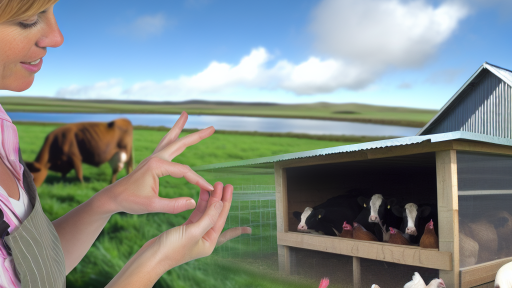Overview of Agricultural Land Use
Definition of Agricultural Land Use
Agricultural land use refers to the utilization of land for farming activities.
This includes cultivating crops and raising livestock.
Additionally, it encompasses practices like horticulture and aquaculture.
Such use plays a vital role in food production.
Moreover, it contributes to rural economies and employment.
Importance of Agricultural Land Use
Agricultural land use is crucial for several reasons.
Firstly, it ensures food security for growing populations.
Secondly, it supports biodiversity and ecosystem health.
Furthermore, it aids in carbon sequestration and climate regulation.
Effective land use helps optimize resource efficiency.
For instance, sustainable farming practices improve soil health.
In addition, responsible land management protects water resources.
Challenges Facing Agricultural Land Use
Many challenges threaten effective agricultural land use.
Urbanization leads to loss of arable land.
Climate change exacerbates weather variability and affects yields.
Transform Your Agribusiness
Unlock your farm's potential with expert advice tailored to your needs. Get actionable steps that drive real results.
Get StartedAdditionally, soil degradation threatens long-term productivity.
Farmers require support to adapt to these challenges.
Regulatory Frameworks for Agricultural Land Use
Zoning laws regulate land use to ensure sustainable practices.
These laws establish designated zones for agriculture.
They help prevent conflicts between agricultural and urban development.
Local governments often implement these laws through planning processes.
Moreover, regulations may include conservation easements.
Such measures protect valuable agricultural lands from development.
Types of Agricultural Land Use
Crop Production
Crop production dominates agricultural land use in many regions.
Farmers grow various types of crops to meet food demands.
Popular crops include grains, fruits, and vegetables.
Different climates support diverse crop types and growing practices.
Farmers often rotate crops for better soil health.
Crop rotation also helps manage pests naturally.
Livestock Farming
Livestock farming is another key type of agricultural land use.
This practice includes raising animals for meat, milk, and eggs.
Cattle, sheep, pigs, and chickens are common livestock species.
Livestock farming requires substantial land for grazing and shelter.
Farmers must comply with animal welfare regulations.
Additionally, livestock can contribute to soil fertility through manure.
Specialty Farming
Specialty farming focuses on niche markets and unique products.
This category includes organic farming, aquaculture, and greenhouse production.
Organic farming emphasizes natural growing methods without synthetic chemicals.
Aquaculture deals with raising fish and other aquatic organisms.
Showcase Your Farming Business
Publish your professional farming services profile on our blog for a one-time fee of $200 and reach a dedicated audience of farmers and agribusiness owners.
Publish Your ProfileGreenhouse production allows for year-round cultivation of delicate plants.
Specialty farming often attracts higher market prices due to limited supply.
Understanding Zoning Laws
Definition of Zoning Laws
Zoning laws dictate how land can be used in a given area.
They establish regulations for residential, commercial, and agricultural use.
These laws aim to enhance community welfare and manage urban growth.
Additionally, they protect property values and the environment.
Purpose of Zoning Laws
Zoning laws serve multiple important purposes.
Firstly, they ensure that land is developed in an orderly manner.
This organization minimizes conflicts between different land uses.
For instance, residential areas are kept separate from industrial zones.
Benefits of Zoning Laws
One key benefit is the protection of public health and safety.
Zoning laws help to reduce overcrowding in urban areas.
Furthermore, they often include provisions for parks and recreational spaces.
This increases the quality of life for residents.
Challenges of Zoning Laws
Despite their advantages, zoning laws can pose challenges.
They may restrict property owners from using their land as they wish.
This can lead to disputes between landowners and municipalities.
Moreover, zoning laws may become outdated as communities evolve.
Examples of Zoning Regulations
Zoning regulations vary widely from place to place.
For example, some areas may have strict height limits for buildings.
Others may restrict the types of businesses that can operate within certain zones.
Additionally, agricultural zoning may protect crop-producing areas from urban sprawl.
Role of Zoning Laws in Community Planning
Zoning laws play a crucial role in land use and community planning.
They help to balance development with the need for open spaces.
Ultimately, understanding these laws can facilitate better land management.
Learn More: Integrated Pest Management Guidelines
The Relationship Between Agricultural Land Use and Zoning Laws
Understanding Zoning Laws
Zoning laws regulate land use in specific areas.
They define what activities can occur on particular parcels of land.
For instance, some areas may be designated for agriculture only.
This designation affects local farming practices directly.
Additionally, zoning laws can support sustainable land management.
They help prevent urban sprawl that encroaches on farmland.
The Impact on Agricultural Land Use
Zoning laws significantly influence agricultural operations.
They can restrict the type of crops that farmers can grow.
Moreover, these laws can dictate when and how land can be used.
Local authorities often re-evaluate zoning regulations.
This process ensures regulations meet current agricultural needs.
Case Studies of Zoning Regulations
One illustrative example is Davis County in California.
They enacted strict zoning laws to protect prime agricultural land.
These laws effectively prevented development in key farming areas.
Showcase Your Farming Business
Publish your professional farming services profile on our blog for a one-time fee of $200 and reach a dedicated audience of farmers and agribusiness owners.
Publish Your ProfileAnother example is the success seen in Vermont.
The state utilizes zoning to promote agricultural sustainability.
Challenges and Controversies
Despite their benefits, zoning laws can create challenges.
Some farmers feel these regulations limit their business potential.
Additionally, conflicts can arise between developers and farmers.
This tension can lead to public debates over land priorities.
Future Considerations
As urban areas expand, zoning laws will evolve.
Lawmakers may need to create more adaptive policies.
These policies should balance development and agricultural needs.
Collaboration with farming communities will be essential.
Ultimately, effective zoning laws can enhance agricultural land use.
Explore Further: Food Safety Compliance Strategies for Small Farmers
Impact of Zoning Laws on Farmers and Agricultural Practices
Definition and Purpose of Zoning Laws
Zoning laws regulate land use and development in designated areas.
They aim to promote orderly growth and protect agriculture.
These laws determine what activities are permitted on specific parcels of land.
Farmers and developers must understand these regulations to operate effectively.
Effects of Zoning on Agricultural Operations
Zoning laws significantly impact agricultural practices.
They can restrict or enhance farming activities based on local ordinances.
For instance, some areas may limit the use of certain chemicals.
This limitation can affect crop yields and farming techniques.
Moreover, zoning can determine the size of structures on farmland.
This regulation influences the efficiency of farming operations.
Compliance Challenges for Farmers
Farmers often face compliance challenges with zoning laws.
Maintaining awareness of constantly changing regulations is crucial.
Failure to comply can result in fines and operational shutdowns.
Many farmers struggle with paperwork and zoning classifications.
Legal assistance may be necessary to navigate these complexities.
Benefits of Proper Zoning
When properly enforced, zoning can benefit the agricultural sector.
It can protect prime farmland from industrial encroachment.
This protection ensures sustainable food production levels.
Moreover, appropriate zoning can enhance local economies.
It encourages the development of agribusinesses that support farmers.
Case Studies Illustrating Zoning Impacts
Several case studies highlight the impacts of zoning on farmers.
In Maplewood, stricter zoning helped preserve agricultural land.
This action led to increased crop production and community support.
Conversely, in Rivertown, lax zoning allowed urban sprawl.
This sprawl resulted in the loss of valuable farmland.
Future Trends in Zoning Laws
The future of zoning laws will likely evolve with agricultural needs.
Smart growth initiatives could emerge to balance development and farming.
Technology will play a crucial role in monitoring land use.
Showcase Your Farming Business
Publish your professional farming services profile on our blog for a one-time fee of $200 and reach a dedicated audience of farmers and agribusiness owners.
Publish Your ProfileFarmers may need to advocate for more adaptive zoning regulations.
This advocacy will ensure their practices align with community goals.
Uncover the Details: Common Misconceptions About Agricultural Insurance Policies

Challenges Farmers Face Due to Zoning Regulations
Understanding Zoning Regulations
Zoning regulations dictate land use across various regions.
These laws can significantly impact agricultural operations.
Farmers often find themselves navigating complex zoning codes.
Additionally, regulations vary between municipalities and counties.
Restrictions on Land Use
Zoning laws often limit the types of crops farmers can plant.
These restrictions may hinder the adaptive capacity of farms.
For instance, certain areas may restrict livestock farming.
This limitation affects the sustainability of some agricultural practices.
Permitting Challenges
Farmers frequently encounter barriers when acquiring permits.
The permitting process can be lengthy and bureaucratic.
Consequently, delays may arise during critical planting seasons.
Moreover, the costs associated with permits can be prohibitive.
Impact on Property Value
Zoning changes can alter the value of agricultural land.
Farmers may find their land worth less due to strict regulations.
For example, conversion from agricultural to commercial use can lower values.
This loss of value can be detrimental to farmers’ financial stability.
Community Resistance
Farmers often face opposition from local communities.
Neighbors may resist changes to zoning that benefit agriculture.
This resistance can stem from concerns about noise or pollution.
Such community sentiments can influence local zoning decisions.
The Need for Advocacy
Active engagement in local governance is essential for farmers.
Farmers must advocate for regulations that support sustainable practices.
Joining local agricultural associations can amplify their voices.
Effective advocacy can lead to favorable zoning outcomes.
See Related Content: Sustainable Farming Under Water Restrictions
Case Studies: Successful Zoning Law Strategies in Agriculture
Introduction to Zoning Strategies
Zoning laws play a crucial role in agricultural land use.
They regulate where farming activities can occur.
Effective zoning enhances agricultural productivity.
Additionally, it protects agricultural land from urban sprawl.
Case Study: Innovative Zoning in Riverton
Riverton implemented mixed-use zoning to support farmers.
This approach encourages local markets and community-supported agriculture.
Farmers benefit from direct sales to consumers.
This strategy has increased local economic activity.
Community Involvement
Community meetings helped shape the zoning plan.
Residents voiced their needs regarding local food access.
This collaboration built public support for the initiative.
Results
Farmers reported a 30% increase in revenues.
Showcase Your Farming Business
Publish your professional farming services profile on our blog for a one-time fee of $200 and reach a dedicated audience of farmers and agribusiness owners.
Publish Your ProfileThe community now enjoys more fresh produce options.
This case demonstrates effective zoning can unite communities.
Case Study: Green Valley Agricultural Reserve
Green Valley established an agricultural reserve to preserve farmland.
This designated area prevents conversion to non-agricultural uses.
Landowners receive tax incentives for maintaining agricultural use.
As a result, farmland remains productive and economically viable.
Long-term Benefits
The reserve has safeguarded vital ecosystems.
It supports local wildlife and reduces pollution.
This strategy promotes sustainable agricultural practices.
Lessons Learned
Engaging stakeholders early in the process is essential.
Transparent communication builds trust among landowners.
Successful implementation depends on ongoing community support.
Case Study: Sustainable Practices in Southdale
Southdale adopted zoning to encourage sustainable farming practices.
They introduced regulations on pesticide use and water management.
These measures have led to improved soil and water quality.
Farmers are more resilient to climate change effects.
Training and Resources
Farmers receive training on sustainable techniques.
Local government partners with agricultural organizations.
This collaboration has increased awareness and adoption of best practices.
Community Engagement
Regular workshops foster knowledge sharing among farmers.
This creates a community of learning and support.
The initiative has improved relationships among agricultural stakeholders.
Implications of Zoning Law Innovations
These case studies highlight the importance of innovative zoning laws.
Each strategy successfully supports agricultural land use.
Communities can adapt these lessons to their unique contexts.
Together, they can enhance local agricultural sustainability and resilience.
Future Trends in Agricultural Land Use and Zoning Law Adaptations
Increasing Demand for Sustainable Practices
Farmers are adopting sustainable agricultural methods to meet consumer demand.
These practices focus on reducing environmental impacts.
Moreover, they help in preserving natural resources for future generations.
Technological Advancements in Agriculture
Emerging technologies are revolutionizing agricultural practices.
Precision farming techniques are optimizing land use efficiency.
Moreover, automation and drones are enhancing productivity and reducing labor costs.
Regulatory Changes and Adaptations
Government regulations are evolving to support sustainable agriculture.
These changes include updated zoning laws that accommodate new farming practices.
Local governments are also incentivizing farmers to adopt eco-friendly methods.
Community Involvement in Zoning Decisions
Community engagement in zoning decisions is becoming more important.
Residents are increasingly voicing their preferences for land use.
Public input helps shape policies that reflect the needs of local populations.
Impact of Climate Change
Climate change is driving adjustments in agricultural land use.
Farmers are shifting to more resilient crops and practices.
Showcase Your Farming Business
Publish your professional farming services profile on our blog for a one-time fee of $200 and reach a dedicated audience of farmers and agribusiness owners.
Publish Your ProfileConsequently, zoning laws must adapt to these changing agricultural needs.
Urban Agriculture Growth
Urban agriculture is gaining popularity in city landscapes.
Community gardens and vertical farms are emerging to meet local food needs.
These developments require zoning laws that support urban farming initiatives.
Integrating Agricultural and Residential Areas
There is a trend towards integrating agricultural spaces within urban areas.
This integration fosters community relationships and strengthens food security.
Zoning laws will need to accommodate mixed-use developments in these areas.
Preserving Agricultural Land Amid Urban Growth
As cities expand, preserving agricultural land becomes critical.
New zoning strategies are necessary to protect these important spaces.
Farm-compatible zoning can balance development and agricultural needs.




